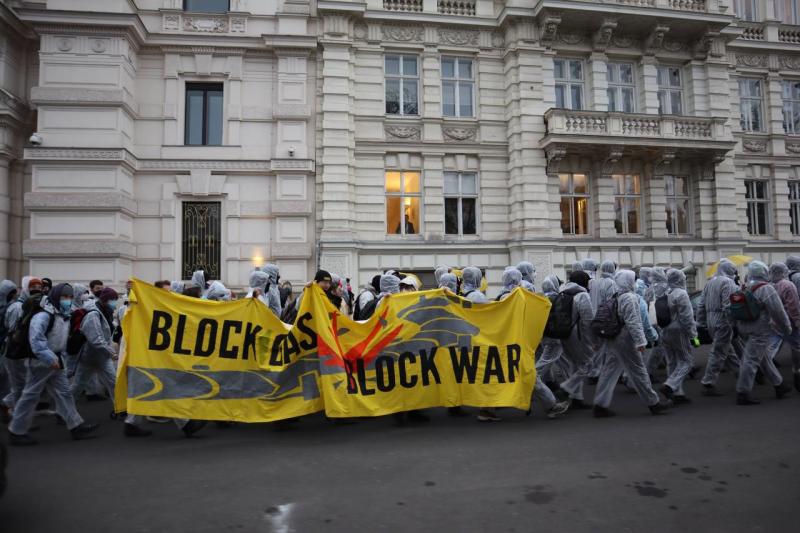Stay always informed
Interested in our articles? Get the latest information and analysis straight to your email. Sign up for our newsletter.

Originally published in Social Europe on 26.03.24
This year’s European Gas Conference (EGC), which was to have run from Monday to Wednesday this week, has been postponed. Senior gas-industry executives, financiers and decision-makers are not rubbing shoulders in Vienna, raising champagne glasses and doing deals that will wreck the climate and the communities and environments along the gas supply chain. It is a huge success for the climate-justice movement, showing what it can do when it challenges the corporate gas lobby.
The conference organiser, the Energy Council—self-promoted as ‘the world’s most exclusive energy network’ of ‘senior upstream oil & gas executives’—claimed it had to postpone as it could not guarantee the ‘safety’ of all participants, given what had happened last year in Vienna. In 2023, the Block Gas Alliance organised a carnival of disruption. From mass blockades against the hosting hotel to disrupting the gala dinner, protesters—and the resulting media attention—made sure participants could not conduct business as usual in private. Rather than making deals and lobbying decision-makers behind closed doors, they were faced with the reality of their actions, as speakers from Don’t Gas Africa decried the impact of Europe’s latest neocolonial dash for gas.
That is why, this time last year, Corporate Europe Observatory (CEO) asked: ‘Will this be the last European Gas Conference?’ Could that really be true? The gas lobby has been at the heart of European Union decision-making for decades, stopping the phase-out of fossil fuels. The EGC maintains this status quo by actively facilitating meetings between gas lobbyists and ministers and regulators. Its promotional material boasts of ‘unparalleled opportunities to network’, ‘100 tailored meetings’ and ‘three days of formal and informal discussions’.
Yet despite the protests, EGC 2024 appeared to be going ahead. Sponsors had been announced. These included not just the long-term host, OMV, Austria’s main oil and gas company, but also the US firm Cheniere, responsible for the country’s largest liquefied-natural-gas (LNG) terminal, Sabine Pass, accused of poisoning the local community and the climate by not repairing known leaks. At least 15 other companies were sponsoring, from banks to law firms to technology platforms.
But then sponsorship secures an EGC speaking slot, in addition to branding opportunities to ‘enhance your profile’. That meant much of the programme was already finalised, filled with keynotes and panels. These included the Italian gas transporter Snam—involved in the controversial Trans Adriatic Pipeline and more recently the Southern H2 corridor—and the Romanian energy minister, whose government has given its full backing to OMV’s offshore project Neptune Deep (also sponsoring). When CEO inquired about sponsorship, we were politely advised that, given our stance towards gas, it ‘wouldn’t make business sense’.
This year’s conference agenda underlined industry’s push for more US LNG and new sources of gas, particularly from Africa and the eastern Mediterranean—oblivious to the continuing genocide in Gaza. But while day three was to be dedicated to ‘Hydrogen and the Energy Transition’, the content was not about making the transition from gas but doubling down, focusing on purported technological solutions such as carbon capture and storage.
In response to the anti-green backlash across Europe, the gas industry wrongly thinks it can continue drilling, using arguments such as energy security and the high cost of green measures—ignoring the fact that energy bills have been inflated by … gas prices. But according to the Jacques Delors Centre, the backlash is being overblown: the public still backs more ambitious climate policies, while not wanting low- and medium-income households to pay for them. A transition away from fossil fuels has to be socially just or it will not happen.
Ten days before it was due to begin, news broke that the conference had been postponed, the new date kept secret. The decision cannot have been taken lightly and would have been extremely costly. While the official claim was around security, the police privately confirmed that this was not an issue. A shortfall in ticket sales is also probable: now that the EGC has become a public target of the climate-justice movement, under more scrutiny than ever, keeping the content of private meetings and informal conversations secret becomes harder.
When CEO applied for a ticket—€3,799 for ‘standard’ and €4,399 for ‘premium’—the organisers said we would have to sign a non-disclosure agreement, as would any journalists, to stop us reporting what we had heard. Last year most journalists were refused entry, some even having their accreditation revoked. Yet clearly this was not enough to reassure participants that what was discussed at the EGC would remain private.
Bad publicity is also a reputational risk. The Marriott Hotel, and its distinctive logo, was in every picture last year, surrounded by police and protesters. No wonder the venue shifted to the Hilton. And given the gas industry still presents itself as part of the solution, bad publicity undermines its expensive ‘greenwashing’, intended to convince the public it is not frying the climate or trashing communities.
The new date is a secret, but whenever (and wherever) it is the climate-justice movement needs to keep it in the public eye, exposing the agenda being shaped by a profit-hungry industry and its real-world impact on communities and the climate. In the meantime, there is a victory to celebrate: the planned counter-conference and mass actions have not been cancelled, but the gas industry’s gala dinner has been nixed—raise a glass to that!